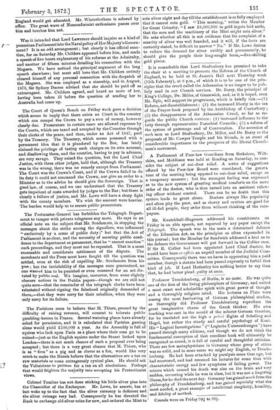The Court of Queen's Bench on Friday week gave a
decision which seems to imply that there exists no Court in the country which can compel the Crown to pay a sum of money, however -clearly due. Prosecutors in certain cases are allowed expenses by the Courts, which are taxed and accepted by the Counties through their clerks of the peace, and then, under an Act of 1847, paid 'by the Treasury. The Treasury, which seems possessed with a permanent idea that it is plundered by the Bar, has lately -claimed the privilege of taxing such charges on its own account, and disallowing them, and the counties, having to pay in advance, are very savage. They raised the question, but the Lord Chief -Justice, with three other judges, held that, although the Treasury was in the wrong, there was no remedy except from Parliament. The Court was the Crown's Court, and if the Crown failed to do its duty it could not command the Crown, nor give an order to a Minister as to the advice he should give the Sovereign. That is good law, of course, and we can understand that the Treasury gets impatient of costs awarded by judges to the Bar; but there is -clearly a failure of justice, and Mr. Lowe will have a sharp fight with the county members. We wish the amount were heavier. The burden would help us to secure public prosecutors.






































 Previous page
Previous page